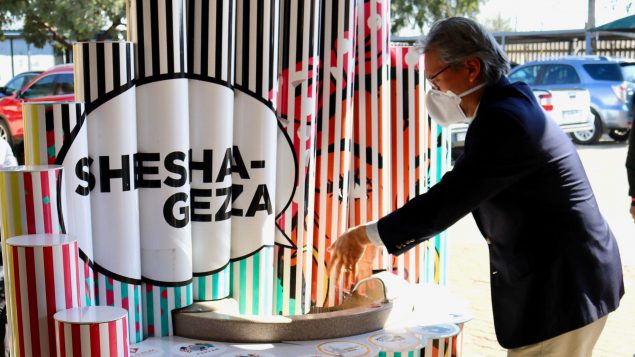Mobile handwashing stations launched to fight COVID-19

Dr. Romel Lacson, CDC South Africa Acting Country Director at the time the photo was taken, visits a Shesha Geza hand hygiene station outside of a public health facility in Ekurhuleni, Gauteng South Africa. Photo credit: Aurum
Proper hand hygiene is one of the simplest and least expensive ways to prevent and control the spread of germs. In times of disease outbreaks such as now, when the world is battling with Coronavirus Disease 2019 (COVID-19), clean hands can save lives.
As simple as that sounds, washing hands with soap and water might not be possible, particularly in resource-limited settings.
South Africa is a semi-arid country that has limited water resources, and adequate water-supply systems remains a challenge. The 2018 General Household Survey found that less than half of South Africans have access to tap water in their homes. The others rely on communal sources, such as community or neighbors’ taps or rivers. Findings also showed that even in metropolitan cities like Johannesburg, Ekurhuleni, Durban and Cape Town — where access to tap water inside homes is very high — it was not without frequent interruptions.
To make it easier to clean hands, the Aurum Institute launched innovative mobile hand hygiene stations, called Shesha Geza. This means “hurry up and wash” in isiZulu. The stations have been placed at several public health facilities in Ekurhuleni in the Gauteng Province, as part of efforts to help curb the spread of COVID-19. The Aurum Institute is the implementing partner for the Centers for Disease Control and Prevention in South Africa.
Bandile Mathandela, Chief Operations Officer at Aurum Innova, subsidiary of The Aurum Institute, says this innovation provides a good solution to areas where access to water is a challenge.

A Shesha Geza hand hygiene station in a high pedestrian traffic area of Ekurhuleni, Gauteng South Africa. Photo credit: Aurum
“Understanding challenges with access to clean water, and soap or sanitizer for some in our country, this solution goes a long way ensuring infection control in high volume areas. We are faced with a new norm of having to wash or sanitize our hands more frequently than in the past. We need to make it easier and accessible for people and the handwashing mobile stations do just that,” he says.
Fifteen hand hygiene stations were rolled out at clinics throughout Ekurhuleni in May and June. An additional 36 units were deployed across Ekurhuleni and the North West Province in June and July, in staggered fashion during phase 2.
The Shesha Geza handwashing stations feature a diluted, chlorine-based sanitizer liquid, which can be used when washing with soap or using an alcohol-based hand sanitizer is not feasible. The chlorine solution is more feasible and cost effective than other alternatives for the locations where Shesha Geza units are deployed. The stations are operated by a foot pump to break the chain of transmission through touching taps.
Balancing mobility and water storage capacity, the 600-liter tank equates to 4,000 hand washes per one cycle. The water in the tank can be used safely for a minimum of 5 cycles, facilitating over 20,000 hand washes before needing to be refilled. The design also allows for hand washing with soap as an alternative to the diluted chlorine-based solution where feasible.
Hand hygiene is an important part of the South African response to the international emergence of COVID-19.
- Wash hands for at least 20 seconds with soap and clean water
- Use a 70% alcohol-based hand sanitizer
- Use a diluted chlorine-based solution, when soap and water, or hand sanitizer aren’t available.
Practicing hand hygiene is a simple yet effective way to limit the spread of COVID-19 and other infections. CDC recommendations reflect this important role.
“We know that hand hygiene helps to remove pathogens and prevent the spread of disease, so practicing frequent hand hygiene is recommended,” adds CDC South Africa Acting Country Director, Dr. Romel Lacson.